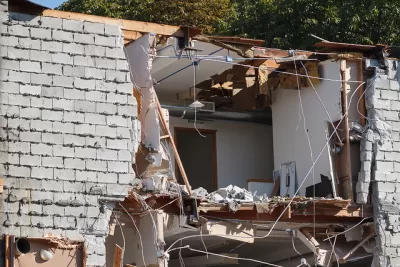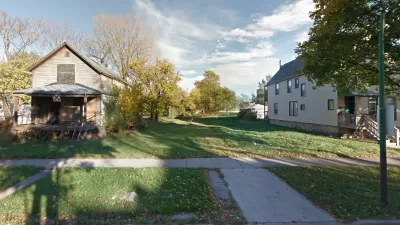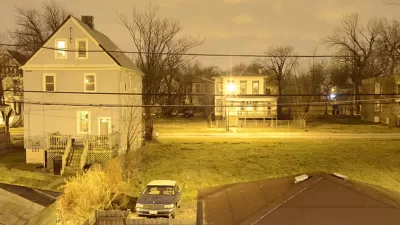There's a rationale for the demolition of vacant properties in cities like Chicago, but does that mean the city should be celebrating these programs? The planning of shrinking cities, it turns out, is still very much a work in progress.

An article by Chris Hagan tackles some of the troubling aspects of demolition programs in the city of Chicago.
First there's the question of whether the city's many demolition programs, resulting in the demolition of 3,100 buildings since 2008, are laying a foundation for neighborhood revitalization. In areas where private developers are pulling demolition permits, redevelopment often follows. The same potential for redevelopment isn't present when the city demolishes buildings, according to Hagan.
The article focuses on the varying goals and results of the city's approach to vacant lots and city-owned properties. Despite efforts to intervene with troubled buildings and properties (examples include the Large Lots Program, the Troubled Building Initiative, and a forfeiture program for vacant buildings) the city currently owns about 15,000 vacant lots, according to Hagan.
Thus, the question of how residents should feel about buildings being torn down in the neighborhoods. Pubic officials are ready to laud demolition programs as a win for public safety and redevelopment. The article opens with an anecdote about a press conference "kicking off the latest city initiative to tear down vacant buildings in high-crime police districts," which included a "group of Chicago city officials — including now-Chicago Police Superintendent Eddie Johnson" speaking into a "an official City of Chicago podium with microphones jutting out the top."
So should the city be celebrating when it tears down another building, or its 100th building, or any building—especially when it doesn't always have a plan for what comes next?
FULL STORY: Should Chicago Be Celebrating Demolitions?

Planetizen Federal Action Tracker
A weekly monitor of how Trump’s orders and actions are impacting planners and planning in America.

Maui's Vacation Rental Debate Turns Ugly
Verbal attacks, misinformation campaigns and fistfights plague a high-stakes debate to convert thousands of vacation rentals into long-term housing.

San Francisco Suspends Traffic Calming Amidst Record Deaths
Citing “a challenging fiscal landscape,” the city will cease the program on the heels of 42 traffic deaths, including 24 pedestrians.

Defunct Pittsburgh Power Plant to Become Residential Tower
A decommissioned steam heat plant will be redeveloped into almost 100 affordable housing units.

Trump Prompts Restructuring of Transportation Research Board in “Unprecedented Overreach”
The TRB has eliminated more than half of its committees including those focused on climate, equity, and cities.

Amtrak Rolls Out New Orleans to Alabama “Mardi Gras” Train
The new service will operate morning and evening departures between Mobile and New Orleans.
Urban Design for Planners 1: Software Tools
This six-course series explores essential urban design concepts using open source software and equips planners with the tools they need to participate fully in the urban design process.
Planning for Universal Design
Learn the tools for implementing Universal Design in planning regulations.
Heyer Gruel & Associates PA
JM Goldson LLC
Custer County Colorado
City of Camden Redevelopment Agency
City of Astoria
Transportation Research & Education Center (TREC) at Portland State University
Jefferson Parish Government
Camden Redevelopment Agency
City of Claremont




























